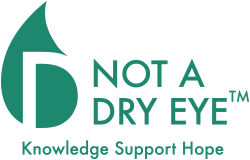Many hormones play a role in the production and secretion of meibum. This table, by The International Workshop on Meibomian Gland Dysfunction, displays the effect hormones have on meibomian glands.
Control of Sebaceous Gland and/or Sebocyte Growth and Lipid Production
| Factor | Growth | Lipid Production |
| Adrenocorticotropic hormone | ↑ | |
| Androgen | ↑ | ↑ |
| Basic fibroblast growth factor | ↑ | |
| Calcitonin gene-related peptide | R | R |
| Corticotropin-releasing hormone | ↑ | ↑ |
| Epidermal growth factor | ↑ | |
| Estrogen | ↓ | ↓ |
| Growth hormone | ↑ | |
| Hydrocortisone | ↑ | |
| Insulin | ↑ | |
| Insulin-like growth factor-I | ↑ | |
| Insulin-like growth factor-II | ↑ | |
| Keratinocyte growth factor | ↑ | |
| Neuropeptide Y | R | R |
| Peroxisome proliferator activated receptor ligands | ↑ | |
| Pituitary extract (bovine) | ↑ | |
| Progestin | ∼ | |
| Retinoid | ↓ | ↓ |
| Substance P | ↑ | ↑ |
| Thyroid-stimulating hormone | ↑ | |
| Thyroxine | ↓ | ↑ |
| Transforming growth factor-α | ↑ | |
| Vasoactive intestinal peptide | R | R |
| α-Melanocyte stimulating hormone | ↑ | ↑ |
| β-Adrenergic agonist | Permissive | |
| β-Endorphin | ↓ | ↑ |
Growth refers to sebocyte proliferation, sebocyte differentiation, and/or glandular size.
Lipid production refers to lipogenesis and/or lipid secretion.
R, functional receptors have been identified, but their role has yet to be determined; ↑, increase; ↓, decrease; ∼, increase, decrease, or no effect, depending, on the type of sebaceous gland.
Reference
The International Workshop on Meibomian Gland Dysfunction: report of the Subcommittee on Anatomy, Physiology, and Pathophysiology of the meibomian gland
Knop E, Knop N, Millar T, Obata H, Sullivan DA.
Investigative Ophthalmology and Visual Science
2011 Mar 30;52(4):1938-78. doi: 10.1167/iovs.10-6997c. Print 2011 Mar.
PMID:21450915
View the full report

